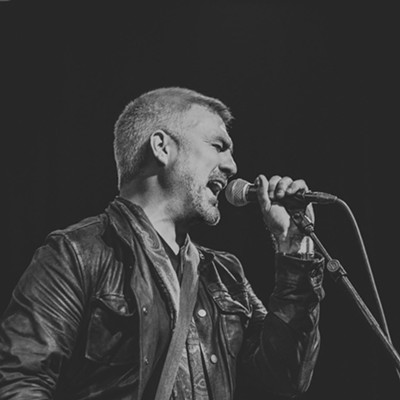Playing the music of Ireland brought Gudrun Walther back to the traditional folk tunes of her native Germany.
Walther is a fiddler, singer and accordion player for the German Celtic band Cara. Although she is a classically trained violinist, she grew up listening to Irish, Scottish and French music at home.
"As a young person in Germany, I also listened to a lot of different stuff in addition to trad Celtic music, including music from Eastern Europe, and the normal pop and rock you get on the radio, including (the) Beatles," Walther said in a recent telephone interview from a tour stop in Maine. "Which is not such a difference from a kid growing up in another country, I guess. But I guess I was different from other kids in that the coolest music to me when I was 16 was the Tannahill Weavers and the Battlefield Band."
Cara will return to Tucson for a concert Saturday, Aug. 29, at the Temple of Music and Art, with opening act 2Duos (read more below).
Cara, a quintet, was formed about six years ago. The group has seen the release of two excellent Celtic albums—In Colour in 2004, and In Between Times in 2007—as well as the live CD and DVD In Full Swing. They've also toured the world several times. A third album is in the works, Walther said.
Walther shares lead vocals in Cara with flutist/pianist Sandra Steinort. Claus Steinort contributes flute, whistles, uilleann pipes and concertina. Rolf Wagels plays bodhrán, and guitarist Jürgen Treyz (whose background includes jazz and blues-rock) completes the lineup.
The members of Cara often have been asked by Celtic fans about the nature and sound of traditional German music, prompting Walther and Treyz to form the group Deitsch.
"We found that there were maybe only four or five things of traditional German music we could play, so we decided we should learn some more, and put a little effort into finding out about the traditional music of our own country," Walther said.
Research into traditional music of any origin can be a time-consuming passion, but it fuels the creative process, she said.
"It goes in phases, I think. There is sometimes a certain phase when I like to read through my old ballad books and see what I find there. Then soon, we'll start collecting material for a new CD, and we'll have all these ideas as a result of the research process. So it all works together."
Walther is especially fond of adapting and re-arranging old traditional tunes, no matter whether they are German or Irish, she said.
"What I enjoy most is when I find a nice, good old ballad, with like 19 verses or more, with lots of heartache and tragedy in it, and I'll cut that song down into some singable form—not like a half-hour of verses, you know—and compose a chorus for it, arranging it and putting in instrumental parts. It's a good way to bring a lost song back to life."
The Cara method is to infuse their Irish-inspired music with jazz and pop influences to create a signature sound that is both traditional and contemporary at the same time. The result is edgy, but also familiar in a way that digs into a cultural subconscious that many listeners share.
Walther and Treyz also wanted to demonstrate through music the similarities between traditional German and Celtic music. Thus came to be the group 2Duos, a collaboration between the two Germans and two well-regarded Scottish musicians: singer-guitarist Aaron Jones (from Old Blind Dogs) and flutist and fiddler Claire Mann.
"In 2Duos, what we try to do is to build a bridge, if you will, between the sides of so-called Celtic music, which sort of means the music of Scotland and Ireland, and the German side we had been exploring," Walther said.
2Duos have released one album so far, the jaunty and charming Until the Cows Come Home, on which Walther and Jones trade lead singing duties. Jones sings lovely English-language material such as the traditional tune "Midlothian Mining Song" and Richard Thompson's "Beeswing," while Walther handles the vocals on trad German numbers such as "Der Markgrafensohn" and "Stets in Trauer."
Walther added that she thrives on pursuing divergent directions in music.
"For me, it's definitely fun having 2Duos and Deitsch in addition to Cara, because I like to do different things. As much as I love Cara and all the other members, I couldn't spend my whole life, all year around, playing with them and doing the same stuff. And I think the others are the same. We all have different projects."
At the time of the interview, Cara and 2Duos had not yet toured together. On the eve of the two groups' first concert together, Walther was curious to see how it would work out.
"We've never done the double-bill thing with 2Duos and Cara, so I am eager to see how it works out. I hope I am not too exhausted from it. But I think it will end up being exciting and giving me more energy."
While in Arizona, Cara and 2Duos also will perform in Flagstaff and Phoenix. They'll arrive in Tucson several days before the concert here for a series of master classes and workshops.
The lessons are not intended for beginners but for experienced musicians in bodhrán, fiddle, flute, guitar and whistle. For more information about these sessions, contact Melissa Tatum at 275-3811.







